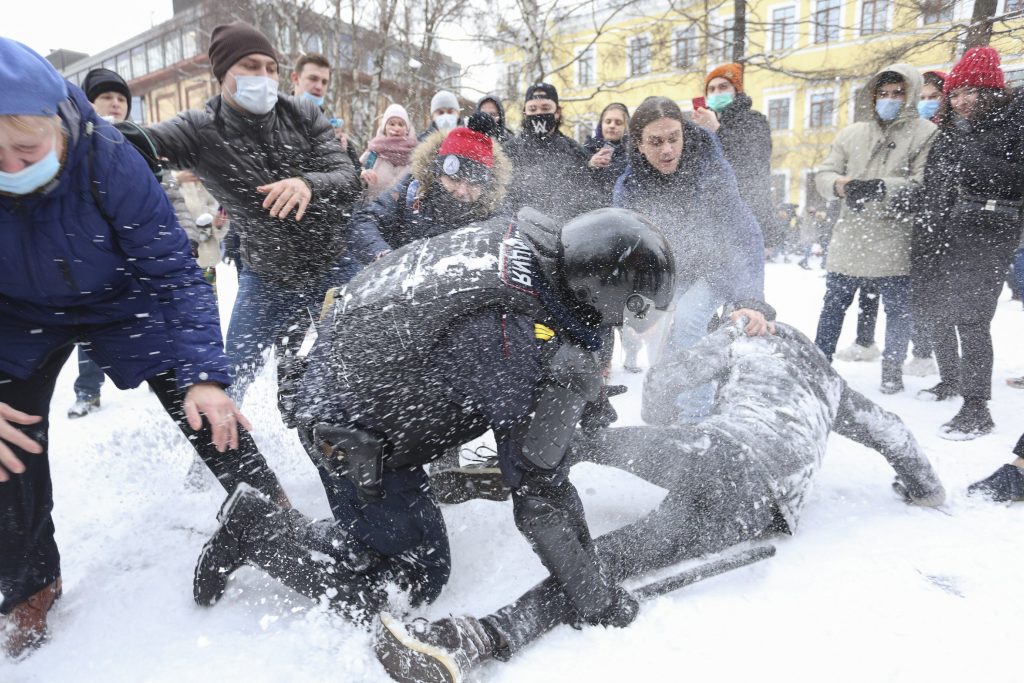Moscow: Chanting slogans against President Vladimir Putin, tens of thousands took to the streets Sunday across Russia to demand the release of jailed opposition leader Alexei Navalny, keeping up nationwide protests that have rattled the Kremlin. More than 5,000 people were detained by police, according to a monitoring group, and some were beaten.
The massive protests came despite efforts by Russian authorities to stem the tide of demonstrations after tens of thousands rallied across the country last weekend in the largest, most widespread show of discontent that Russia had seen in years. Despite threats of jail terms, warnings to social media groups and tight police cordons, the protests again engulfed cities across Russia’s 11 time zones Sunday.
Navalny’s team quickly called another protest in Moscow for Tuesday, when he is set to face a court hearing that could send him to prison for years.
The 44-year-old Navalny, an anti-corruption investigator who is Putin’s best-known critic, was arrested Jan. 17 upon returning from Germany, where he spent five months recovering from nerve-agent poisoning that he blames on the Kremlin. Russian authorities have rejected the accusations. He was arrested for allegedly violating his parole conditions by not reporting for meetings with law enforcement when he was recuperating in Germany.
The United States urged Russia to release Navalny and criticized the crackdown on protests.
“The U.S. Condemns the persistent use of harsh tactics against peaceful protesters and journalists by Russian authorities for a second week straight,” U.S. Secretary of State Antony Blinken said on Twitter.
The Russian Foreign Ministry rejected Blinken’s call as “crude interference in Russia’s internal affairs” and accused Washington of trying to destabilize the situation in the country by backing the protests.
Sunday, police detained more than 5,000 people in cities nationwide, according to OVD-Info, a group that monitors political arrests, surpassing some 4,000 detentions at the demonstrations across Russia Jan. 23.
In Moscow, authorities introduced unprecedented security measures in the city center, closing subway stations near the Kremlin, cutting bus traffic and ordering restaurants and stores to stay closed.
Navalny’s team initially called for Sunday’s protest to be held on Moscow’s Lubyanka Square, home to the main headquarters of the Federal Security Service, which Navalny contends was responsible for his poisoning. Facing police cordons around the square, the protest shifted to other central squares and streets.
Police were randomly picking up people and putting them into police buses, but thousands of protesters marched across the city center for hours, chanting “Putin, resign!” and “Putin, thief!” — a reference to an opulent Black Sea estate reportedly built for the Russian leader that was featured in a widely popular video released by Navalny’s team.
“I’m not afraid, because we are the majority,” said protester Leonid Martynov. “We mustn’t be scared by clubs because the truth is on our side.”
At one point, crowds of demonstrators walked toward the Matrosskaya Tishina prison where Navalny is being held. They were met by phalanxes of riot police who pushed the march back and chased protesters through courtyards.
Demonstrators continued to march around the Russian capital, zigzagging around police cordons. Officers broke them into smaller groups and detained scores, beating some with clubs and occasionally using tasers.
Over 1,600 people were detained in Moscow, including Navalny’s wife, Yulia, who was released after several hours pending a court hearing Monday on charges of taking part in an unsanctioned protest.
Amnesty International said that authorities in Moscow have arrested so many people that the city’s detention facilities have run out of space. “The Kremlin is waging a war on the human rights of people in Russia, stifling protesters’ calls for freedom and change,” Natalia Zviagina, the group’s Moscow office head, said in a statement.
Several thousand people marched across Russia’s second-largest city of St. Petersburg, chanting “Down with the czar!” and occasional scuffles erupted as some demonstrators pushed back police who tried to make detentions. Over 1,100 were arrested.
Putin says neither he nor any of his close relatives own the property. Saturday, construction magnate Arkady Rotenberg, a longtime Putin confidant and his occasional judo sparring partner, claimed that he himself owned the property.
Navalny fell into a coma on Aug. 20 while on a flight from Siberia to Moscow and the pilot diverted the plane so he could be treated in the city of Omsk. He was transferred to a Berlin hospital two days later. Labs in Germany, France and Sweden, and tests by the Organization for the Prohibition of Chemical Weapons, established that he was exposed to the Novichok nerve agent.
Russian authorities have refused to open a full-fledged criminal inquiry, claiming lack of evidence that he was poisoned.
Navalny was arrested immediately upon his return to Russia earlier this month and jailed for 30 days on the request of Russia’s prison service, which alleged he had violated the probation of his suspended sentence from a 2014 money-laundering conviction that he has rejected as political revenge.
Thursday, a Moscow court rejected Navalny’s appeal to be released, and the hearing Tuesday could turn his 3 1/2-year suspended sentence into one he must serve in prison.
AP

